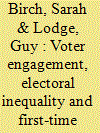| Srl | Item |
| 1 |
ID:
120137


|
|
|
|
|
| Publication |
2013.
|
| Summary/Abstract |
Compulsory rules are known to have far-reaching effects beyond boosting electoral participation rates. This article examines the relationship between compulsory voting and partisan attachments. A theory of attachment formation and strength is engaged that argues that compulsory voting boosts the likelihood that one will identify with a party and, in turn, the strength of party attachments among identifiers. The statistical model accounts for both the hierarchical structure of the data (individuals in elections) and the dual nature of the dependent variable (individuals report a strength of attachment only for the party with which they identify). Using data from the Comparative Study of Electoral Systems, it is demonstrated that compulsory voting does indeed increase both the incidence and the strength of partisanship.
|
|
|
|
|
|
|
|
|
|
|
|
|
|
|
|
| 2 |
ID:
089890


|
|
|
|
|
| Publication |
2009.
|
| Summary/Abstract |
Compulsory voting (CV) undoubtedly raises electoral turnout. Yet does it also affect individual party choices and aggregate election outcomes? Previous studies have focused on partisan or 'directional' effects of CV in favour of, for example, social-democratic or anti-establishment parties. These effects are usually small, however. Using survey data from the Belgian General Elections Study, this article finds that CV primarily affects the consistency, rather than the direction, of party choices. In particular, the analyses suggest that CV compels a substantial share of uninterested and less knowledgeable voters to the polls. These voters, in turn, cast votes that are clearly less consistent with their own political preferences than those of the more informed and motivated voluntary voters. Claims that CV promotes equal representation of political interests are therefore questionable.
|
|
|
|
|
|
|
|
|
|
|
|
|
|
|
|
| 3 |
ID:
140855


|
|
|
|
|
| Summary/Abstract |
This paper reviews the problem of declining turnout and proposes as a solution a system whereby each elector would be legally obliged to vote in the first election for which they were eligible. Popular attitudes toward first-time compulsory voting are measured and probed by means of UK data. The main findings of the paper are that first-time compulsory voting is a politically and administratively feasible proposal that appears tentatively to command popular support and has the potential to help address a number of the problems associated with declining turnout, and in particular low rates of electoral participation among younger citizens.
|
|
|
|
|
|
|
|
|
|
|
|
|
|
|
|